2017-2018学年福建省龙海市第二中学高一上学期第二次月考英语试题(含听力)
2017-2018学年高一英语上学期第二次月考试题_2

2017-2018学年高一英语上学期第二次月考试题(满分:150分时间:120分钟)第Ⅰ卷(选择题,共100分)第一部分听力(共两节,满分20分)(共5小题,每小题1分,满分5分)听下面5段对话。
每段对话后有一个小题,从题中所给的A、B、C三个选项中选出最佳选项,并标在试卷的相应位置。
听完每段对话后,你都有10秒钟的时间来回答有关小题和阅读下一小题。
每段对话仅读一遍。
1. What was the woman’s birthday gift?A. A phone.B. A book.C. A coat.2. Where will the woman have the party?A. At the man’s house.B. At a restaurant.C. At her hous e.3. When did the man buy the shoes?A. Three weeks ago.B. Two weeks ago.C. Three da ys ago.4. How did the man get injured?A. By playing basketball.B. By playing tennis.C. By running .5. What does the woman think of her piano playing?A. She is very professional.B. She is still a beginner.C. She doesn’t know how to play at all.第二节(共15小题:每小题1.分,满分15分)听下面5段对话或独白。
每段对话或独白后有几个小题,从题中所给的A.B.C三个选项中选出最佳选项,并标在试卷的相应位置。
听每段对话或独白前,你将有时间。
阅读各个小题,每小题5秒钟;听完后,各小题将给出5秒钟的作答时间。
每段对话或独白读两遍。
2017-2018学年高一英语上学期第二次月考试题_18

2017-2018学年高一英语上学期第二次月考试题本试卷分第Ⅰ卷(选择题)和第Ⅱ卷(非选择题)两部分。
试卷满分为150分,考试时间120分钟。
Ⅰ卷 (选择题共90分)第一部分听力(共两节,满分30分)第一节(共5小题;每小题1.5分,满分7.5分)听下面5段对话。
每段对话后有一个小题,从题中所给的A、B、C三个选项中选出最佳选项,并标在试卷的相应位置。
听完每段对话后,你都有10秒钟的时间来回答有关小题和阅读下一小题。
每段对话仅读一遍。
1.Why does the man look sleepy today?A.Because he couldn’t sleep well last night.B.Because he spent too much time on the computer.C.Because he kept coughing all night.2.What has the man bought for his wife?A.Tennis shoes. B.Music records. C.Nothing yet .3.What’s the weather like today?A.Rainy in the morning, sunny in the afternoon.B.Rainy in the morning, cloudy in the afternoon.C.Bad in the morning, lovely in the afternoon.4.When does the conversation take place?A.5:15. B.5:30. C.5:45.Why hasn’t the man found any books on genetic engineering? Books of that kind might have been sold out.B.The man came early.C.Books on this shelf are lost.第二节(共15小题;每小题1.5分,满分22.5分)听下面5段对话或独白。
福建省龙海市第二中学2017-2018学年高二下学期期末考试英语试题
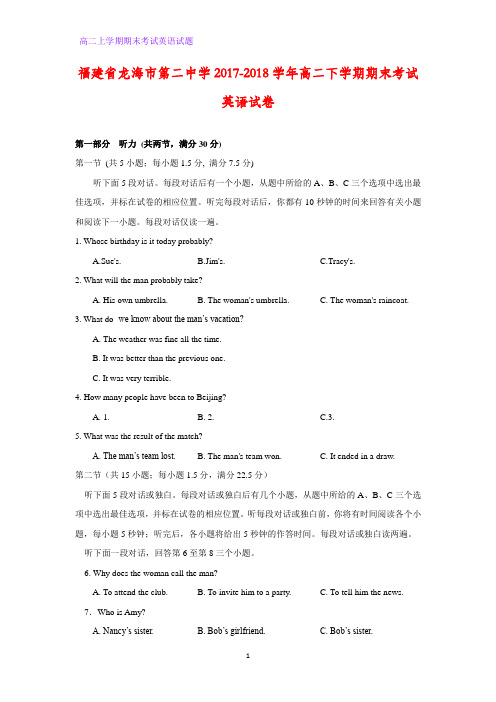
福建省龙海市第二中学2017-2018学年高二下学期期末考试英语试卷第一部分听力(共两节,满分30分)第一节(共5小题;每小题1.5分, 满分7.5分)听下面5段对话。
每段对话后有一个小题,从题中所给的A、B、C三个选项中选出最佳选项,并标在试卷的相应位置。
听完每段对话后,你都有10秒钟的时间来回答有关小题和阅读下一小题。
每段对话仅读一遍。
1. Whose birthday is it today probably?A.Sue's.B.Jim's.C.Tracy's.2. What will the man probably take?A. His own umbrella.B. The woman's umbrella.C. The woman's raincoat.3. What do- we know about the man’s vacation?A. The weather was fine all the time.B. It was better than the previous one.C. It was very terrible.4. How many people have been to Beijing?A. 1.B. 2.C.3.5. What was the result of the match?A. The man’s team lost.B. The man's team won.C. It ended in a draw.第二节(共15小题;每小题1.5分,满分22.5分)听下面5段对话或独白。
每段对话或独白后有几个小题,从题中所给的A、B、C三个选项中选出最佳选项,并标在试卷的相应位置。
听每段对话或独白前,你将有时间阅读各个小题,每小题5秒钟;听完后,各小题将给出5秒钟的作答时间。
每段对话或独白读两遍。
听下面一段对话,回答第6至第8三个小题。
精选2017_2018学年高一英语上学期第二次月考试题A卷
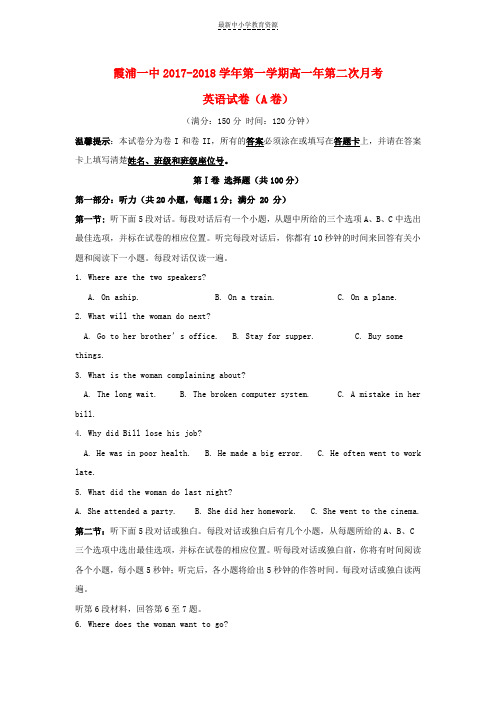
霞浦一中2017-2018学年第一学期高一年第二次月考英语试卷(A卷)(满分:150分时间:120分钟)温馨提示:本试卷分为卷I和卷II,所有的答案必须涂在或填写在答题卡上,并请在答案卡上填写清楚姓名、班级和班级座位号。
第Ⅰ卷选择题(共100分)第一部分:听力(共20小题,每题1分;满分 20 分)第一节: 听下面5段对话。
每段对话后有一个小题,从题中所给的三个选项A、B、C中选出最佳选项,并标在试卷的相应位置。
听完每段对话后,你都有10秒钟的时间来回答有关小题和阅读下一小题。
每段对话仅读一遍。
1. Where are the two speakers?A. On aship.B. On a train.C. On a plane.2. What will the woman do next?A. Go to her brother’s office.B. Stay for supper.C. Buy some things.3. What is the woman complaining about?A. The long wait.B. The broken computer system.C. A mistake in her bill.4. Why did Bill lose his job?A. He was in poor health.B. He made a big error.C. He often went to work late.5. What did the woman do last night?A. She attended a party.B. She did her homework.C. She went to the cinema. 第二节:听下面5段对话或独白。
每段对话或独白后有几个小题,从每题所给的A、B、C三个选项中选出最佳选项,并标在试卷的相应位置。
福建省龙海一中高一英语上学期第二次月考试题
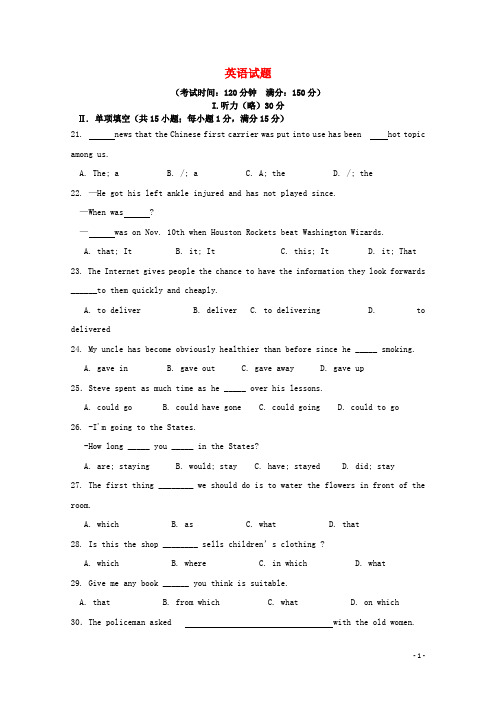
英语试题(考试时间:120分钟满分:150分)I.听力(略)30分Ⅱ. 单项填空(共15小题;每小题1分,满分15分)21. news that the Chinese first carrier was put into use has been hot topic among us.A. The; aB. /; aC. A; theD. /; the22. —He got his left ankle injured and has not played since.—When was ?—was on Nov. 10th when Houston Rockets beat Washington Wizards.A. that; ItB. it; ItC. this; ItD. it; That23. The Internet gives people the chance to have the information they look forwards ______to them quickly and cheaply.A. to deliverB. deliverC. to deliveringD. to delivered24. My uncle has become obviously healthier than before since he _____ smoking.A. gave inB. gave outC. gave awayD. gave up25.Steve spent as much time as he _____ over his lessons.A. could goB. could have goneC. could goingD. could to go26. -I'm going to the States.-How long _____ you _____ in the States?A. are; stayingB. would; stayC. have; stayedD. did; stay27. The first thing ________ we should do is to water the flowers in front of the room.A. whichB. asC. whatD. that28. Is this the shop ________ sells children’s clothing ?A. whichB. whereC. in whichD. what29. Give me any book ______ you think is suitable.A. thatB. from whichC. whatD. on which 30.The policeman asked with the old women.A. what the matter wasB. what was the matterC. what matter wasD. what was the wrong31. ---- Do you prefer ______ rather than join in the journey?---- Yes. I prefer ______ to leaving for the journey.A. stay; to stayB. to stay; stayC. to stay; stayingD. staying; to stay32.—Do you remember ______ we went to Norway?—Yes.The year before last.That was a good trip.A.where B.when C.how D. why33.—We’ve had three whole weeks without a drop of rain.—True. No crops will _____ if the dry weather continues.A. selectB. surviveC. explodeD. remove 34.He took up my cellphone and made a long distance call as if the phone _____ him.A. belonged toB. was belonging toC. was belonged toD. had been belonged to35. The exhibition is well worth _____ and you can see fancy vases of different dynasties on show there.A. to visitB. to be visitedC. being visitedD. visitingⅢ. 完形填空(共20小题;每小题1.5分,满分30分)Mr. Jones had always wanted to make a trip into the middle of Africa to shoot wild animals. 36 first he had no enough money, and then he was married. His wife had not wanted him to 37 her. At last his wife 38 to the trip if he allowed her to go, too.“But it will be very uncomfortable,” Mr. Jone s 39 her. “ It will be very hot and we shall live in a tent, and it 40 be dangerous. ”“I don’t care.” said his wife. “I want to go with you.” So they bought a big tent, camp beds, a refrigerator (电冰箱)which did not need 41 and many other things which would make the trip comfortable, and went off to the__42 of Africa.The first morning, 43 Mr. Jones took his gun and left the tent, he 44 his wife a bell and explained to her, “If you fell in 45 and you need me , 46 this belland I’ll come at once.”After a few minutes, he heard the bell and returned 47 to the tent. “What’s the matter?” he asked.“ 48 ” said his wife, “I was only 49 the bell.” Mr. Jones went off, but after a quarter of an hour, the bell rang 50 .Mr. Jones hurried back to the tent, but his wife said, “I’m 51 . I was cleaning our tent, and I knocked the bell over by mistake.” Mr. Jones returned to his __52 , but soon he heard the 53 once more. This time, when he got back to his 54 , the tent was burning and Mrs. Jones was lying on the ground, with 55 running from a big cut on her shoulder. “That’s better!” said Mrs. Jones. “This time the bell had been used correctly!”36. A. And B. But C. For D. So37. A. leave B. miss C. marry D. care38. A. allowed B. permitted C. satisfied D. agreed39. A. told B. advised C. persuaded D. warned40. A. may B. ought C. can’t D. shall41. A. money B. electricity C. force D. power42. A. south B. middle C. east D. west43. A. while B. until C. before D. after44. A. gave B. sent C. lent D. bought45. A. hurry B. surprise C. safety D. danger46. A. hit B. knock C. beat D. ring47. A. again B. back C. quickly D. home48. A. Something B. Nothing C. No D. None49. A. ringing B. trying C. using D. testing50. A. again B. once C. across D. away51. A. sorry B. happy C. tired D. all right52. A. tent B. wife C. trip D. hunting53. A. shot B. cry C. bell D. shout54. A. house B. garden C. camp D. office55. A.. tears B water C. blood D. sweatⅣ.阅读理解(共15小题;每小题2分,满分30分)ABriana, a student at John Fenwick School in Salem County, US,has a lot of free time. The 13-year-old girl used to hang outon the streets after school. “I know it wasn’t good, but Ireally had nothing else to do,” Briana said.Briana was not alone. Many kids in her city had too much freetime and nothing to do. To solve this problem, four school districts in Salem began Syeada Woods(L)and Briana.a program called Big Brothers/Big Sisters. The program helps students make good use of their after-school time. Big Brothers/Big Sisters invites mentors to help students in grades 6 to 8 build healthy relationships and take part in productive activities.The “Littles” and the “Bigs” are nicknames (昵称) for students and mentors. Most mentors are teachers. The “Bigs” and “Littles” usually meet once a week. They play games, share stories and go on trips.The program has already helped many Salem students.Bria na’s mentor is the school principal (校长), Syeda Woods. Woods took Briana ice-skating, to pizza parties and for a visit to Longwood Gardens in Pennsylvania. “When I got out, I saw that Salem is a very small place,” Briana said. “The program helps me experie nce the outside world and see many new things.”Kathy Jennings, 13, said she was very shy before, but now is much more open.“In the program, I see my mentor as a big sister, not a teacher. I can tell her anything,” Jennings said. “And she has taught me a l ot about making good decisions. I think it will make a big difference in my life.”56. The program of Big Brothers/Big Sisters is designed for .A. students aged 16 to 18B. students aged 8 to 16C. students in senior high schoolD. students in grades 6 to 857. The underline word “mentors” in the second paragraph most probably means “ ”.A. wise and trusted teachersB. experienced policeC. community volunteersD. careful parents58. The purpose of the program is to help students .A. live a full life after schoolB. learn tips on shoppingC. have more free timeD. know more about the streets59. The writer uses the examples of Briana and Kathy to show .A. Syeda is an amazing principleB. the success of the programC. the colourful life in SalemD. Briana was once very shyBA child who has once been pleased with a tale likes, as a rule, to have it retold in almost the same words, but this should not lead parents to treat printed fairy stories as formal texts. It is always much better to tell a story than read it out of a book, and, if a parent can produce what , in the actual situation of the time and the child, is an improvement on the printed text, so much the better.A change made against fairy tales is that they harm the child by frightening him or making him sad thinking. To prove the latter, one would have to show in a controlled experiment that children who have read fairy stories were more often sorry for cruelty than those who had not. As to fears, there are, I think, some cases of children being dangerously terrified by some fairy story. Often, however, this arises(出现) from the child having heard the story once. Familiarity with the story by repetition turns the pain of fear into the pleasure of a fear faced and mastered.There also people who object to fairy stories on the grounds that they are not objectively true, that giants, witches, two-headed dragons, magic carpets, etc. do not exist; and that, instead of being fond of the strange side in fairy tales, the child should be taught to learn the reality by studying history. I find such people, I must say so peculiar(奇怪的)that I don’t know how to argue with them. If their case were sound, the world should be full of mad men attempting to fly from New York to Philadelphia on a stick or covering a telephone with kisses in the belief that it was their beloved girl-friend.No fairy story ever declared to be a description of the real world and no clever child has ever believed that it was.60. The author considers that a fairy story is more effective when it is______.A. repeated without any changeB. treated as a jokeC. set in the presentD. given some changes by the parent61. According to the passage, great fear can take place in a child when the story is____.A. heard for the first timeB. in a realistic settingC. repeated too oftenD. told in a different way62. The author’s mention of sticks and telephones is meant to suggest that______.A. fairy stories are still being made upB. people try to modernize old fairy storiesC. there is some misunderstanding about fairy talesD. There is more concern for children’s fears nowadays63. One of the reasons why some people are not in favor of fairy tales is that_____.A. they are full of imaginationB. they are not interestingC. they just make up the stories which are far from the truthD. they make teachers of history difficult to teachCLike any good mother; when Karen found out that another baby was on the way, she did what she could to help her 3-year-old son, Michael, prepare for a new baby. They find out that the new baby is going to be a girl, and day after day, night after night, Michael sings to his sister in Mommy’s stomach.Finally, Michael’s little sister is born. But she is in serious condition. With alarm in the night, the ambulance rushes the infant to the neonatal(新生儿的)intensive care unit at St. Mary’s Hospital, Knoxville, Tennessee. The days go by. The little girl gets worse. The pediatric(儿科的)specialist tells the parents, “There is very little hope. Be prepared for the worst. ”Karen and her husband contact a local cemetery about a burial plot. They have fixed up a special room in their home for the new baby, but now they plan a funeral. Michael, keeps begging his parents to let him see his sister, “I want to sing to her, ” he says.Karen makes up her mind. She will take Michael whether they like it or not. Ifhe doesn’t see his sister now, he may never see her alive.She dresses him in an oversized suit and marches him into ICU. He looks like a walking laundry basket, but the head nurse recognizes him as a child and shouts, “Get that kid out of here now! No children are allowed. Never disturb patients here. ” The mother rises up strongly and said, “He is not leaving until he sings to his sister! ”Karen leads Michael to his sister’s bedside. He gazes at the tiny infant losing the battle to live. And he begins to sing. In the pure hearted voice of a 3-year-old, Michael sings: “You are my sunshine, my only sunshine, you make me happy when skies are gray. . . ” Instantly the baby girl responds. The pulse rate becomes calm and steady.The next day, the very next day, the little girl is well enough to go home! Woman’s Day magazine called it “the miracle of a brother’s song” . The medical staff just called it a miracle. Karen called it a miracle of Gods love!Never give up on dying people you love.64. What may the underlined words “the infant” in Paragraph 2 refer to?A. The baby.B. Karen.C. Mary.D. Michael.65. What do we know about the little sister after she was born?A. She was driven to St. Mary’s shop.B. A doctor came to see her in her house.C. She was very thin and couldn’t speak.D. She was in great danger.66. Why did Karen firmly let little Michael see his sister in ICU?A. Because he could make his sister alive.B. Because his sister would be sent to a far hospital.C. Because his sister was going to die soon.D. Because his father wanted to take him away.67. What is the general idea of the text?A. A boy’s singing saved his sister’s life.B. The little girl is well enough to go home.C. Michael’s little sister is born with a serious disease.D. No children are allowed to enter the intensive care unit.DAmong the four skills in learning English, which of these is the“Odd-Man-Out” ?The answer is speaking. The other three you can doalone on your own. But you can’t really speak alone! Speaking toyourself can be “dangerous” because men in white coats may come andtake you away!Where can you find people to speak English? And how can you practise speaking when you are alone?At school If you pay to go to a language school, you should use the chance to speak. If your teacher asks you to speak in pairs or groups with other students, try to say as much as possible. Don’t worry about your mistakes. Just speak!Conversation Clubs Many cities around the world have conversation clubs where people can exchange one language for another. Look in your local newspaper to find a conversation club near you. They are usually free although some may charge a small entrance fee.Shopping Even if you don’t want to buy anything, you can ask questions about products that interest you in a shop. “How much does this cost?” “Can I pay by cheque?” Often you can start a real conversation—and it costs you nothing!Cafes and Bars There are often American, Britain, Irish and Australian cafes and bars in many large cities. If you can find one, you’ll probably meet many people speaking English as a first or second language.Language is all around you Everywhere you go, you find language. Shop names, street names, advertisements, notices, and car numbers. . . . When you walk down the street, pr actise reading the words and numbers that you see. Say them to yourself. It’s not exactly a conversation, but it will help you to “think” in English. But don’t speak too loud!Songs and Video Repeat the words of an English-language song singing with the music until it becomes automatic. It’s good practice for your memory and for the mouth muscles that you need for English. Above all, speak as much as possible! Make as many mistakes as possible! When you know that you have made a mistake, you know that youhave made progress!68. What does “Odd-Man-Out” probably mean according to the passage?A. Someone or something appearing different from others.B. Someone or something standing out of the group.C. Someone or something arranged in pairs.D. Someone or something easily mistaken for another.69.What might happen if you speak to yourself loud in public?A. The police will take you away and punish youB. The doctors will force you to stay in hospital.C. You will have to pay to escape being punished.D. You will be forbidden to be member of the club.70. In which places can you learn English NOT free of charge?A. At school, in conversation clubs and cafes and bars.B. At school, in shops, cafes and bars.C. In conversation clubs, shops, songs and video.D. In conversation clubs and in the streets.第Ⅱ 卷(非选择题,共45分)第一节:根据下列句子的意思,在空格处填入正确的词。
2017-2018学年福建省龙海市第二中学高二下学期期末考试 英语 Word版+听力
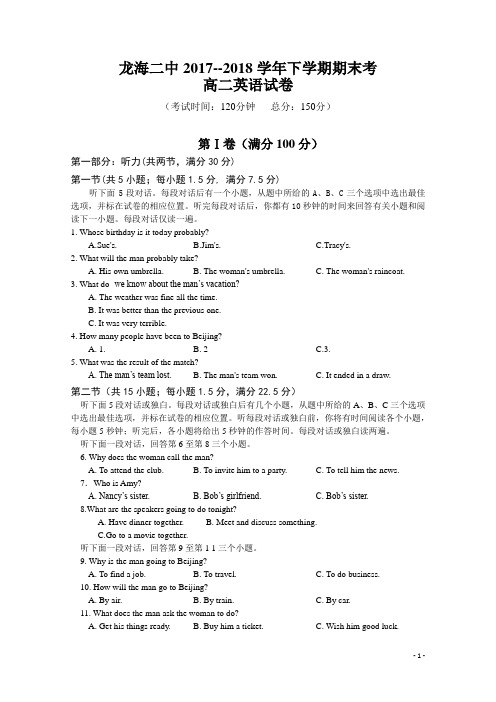
龙海二中2017--2018学年下学期期末考高二英语试卷(考试时间:120分钟总分:150分)第Ⅰ卷(满分100分)第一部分:听力(共两节,满分30分)第一节(共5小题;每小题1.5分, 满分7.5分)听下面5段对话。
每段对话后有一个小题,从题中所给的A、B、C三个选项中选出最佳选项,并标在试卷的相应位置。
听完每段对话后,你都有10秒钟的时间来回答有关小题和阅读下一小题。
每段对话仅读一遍。
1. Whose birthday is it today probably?A.Sue's.B.Jim's.C.Tracy's.2. What will the man probably take?A. His own umbrella.B. The woman's umbrella.C. The woman's raincoat.3. What do- we know about the man’s vacation?A. The weather was fine all the time.B. It was better than the previous one.C. It was very terrible.4. How many people have been to Beijing?A. 1.B. 2C.3.5. What was the result of the match?A. The man’s team lost.B. The man's team won.C. It ended in a draw.第二节(共15小题;每小题1.5分,满分22.5分)听下面5段对话或独白。
每段对话或独白后有几个小题,从题中所给的A、B、C三个选项中选出最佳选项,并标在试卷的相应位置。
听每段对话或独白前,你将有时间阅读各个小题,每小题5秒钟;听完后,各小题将给出5秒钟的作答时间。
2017-2018学年福建省龙海市第二中学高一下学期第一次月考(4月)英语试题
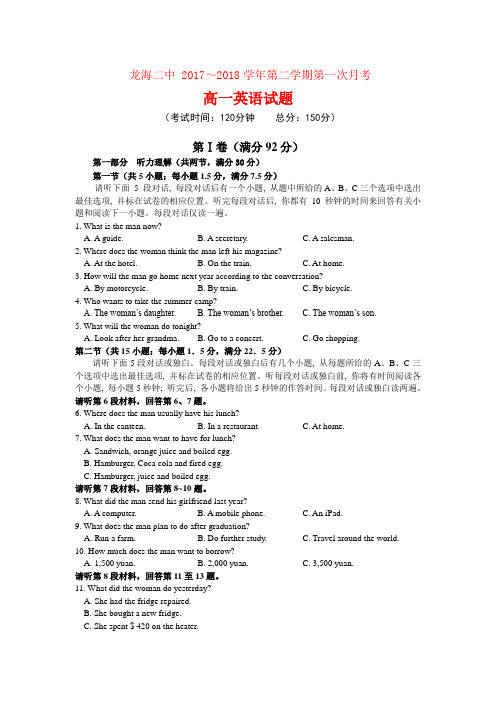
龙海二中2017~2018学年第二学期第一次月考高一英语试题(考试时间:120分钟总分:150分)第Ⅰ卷(满分92分)第一部分听力理解(共两节,满分30分)第一节(共5小题;每小题1.5分,满分7.5分)请听下面5 段对话, 每段对话后有一个小题, 从题中所给的A、B、C三个选项中选出最佳选项, 并标在试卷的相应位置。
听完每段对话后, 你都有10 秒钟的时间来回答有关小题和阅读下一小题。
每段对话仅读一遍。
1. What is the man now?A. A guide.B. A secretary.C. A salesman.2. Where does the woman think the man left his magazine?A. At the hotel.B. On the train.C. At home.3. How will the man go home next year according to the conversation?A. By motorcycle.B. By train.C. By bicycle.4. Who wants to take the summer camp?A. The woman’s daughter.B. The woman’s brother.C. The woman’s son.5. What will the woman do tonight?A. Look after her grandma.B. Go to a concert.C. Go shopping.第二节(共15小题;每小题1.5分,满分22.5分)请听下面5段对话或独白。
每段对话或独白后有几个小题, 从每题所给的A、B、C三个选项中选出最佳选项, 并标在试卷的相应位置。
听每段对话或独白前, 你将有时间阅读各个小题, 每小题5秒钟; 听完后, 各小题将给出5秒钟的作答时间。
福建省龙海市第二中学2017-2018学年高二下学期期末考试英语-含答案

龙海二中2017--2018学年下学期期末考高二英语试卷(考试时间:120分钟总分:150分)第Ⅰ卷(满分100分)第一部分:听力(共两节,满分30分)第一节(共5小题;每小题1.5分, 满分7.5分)听下面5段对话。
每段对话后有一个小题,从题中所给的A、B、C三个选项中选出最佳选项,并标在试卷的相应位置。
听完每段对话后,你都有10秒钟的时间回答有关小题和阅读下一小题。
每段对话仅读一遍。
1. Whose birthday is it today probably?A.Sue's.B.Jim's.C.Tracy's.2. What will the man probably tae?A. His own umbrella.B. The woman's umbrella.C. The woman's raincoat.3. What do- we now about the man’s vacation?A. The weather was fine all the time.B. It was better than the previous one.C. It was very terrible.4. How many people have been to Beijing?A. 1.B. 2C.3.5. What was the result of the match?A. The man’s team lost.B. The man's team won.C. It ended in a draw.第二节(共15小题;每小题1.5分,满分22.5分)听下面5段对话或独白。
每段对话或独白后有几个小题,从题中所给的A、B、C三个选项中选出最佳选项,并标在试卷的相应位置。
听每段对话或独白前,你将有时间阅读各个小题,每小题5秒钟;听完后,各小题将给出5秒钟的作答时间。
福建省龙海市第二中学2017_2018学年高二英语下学期期末考试试题
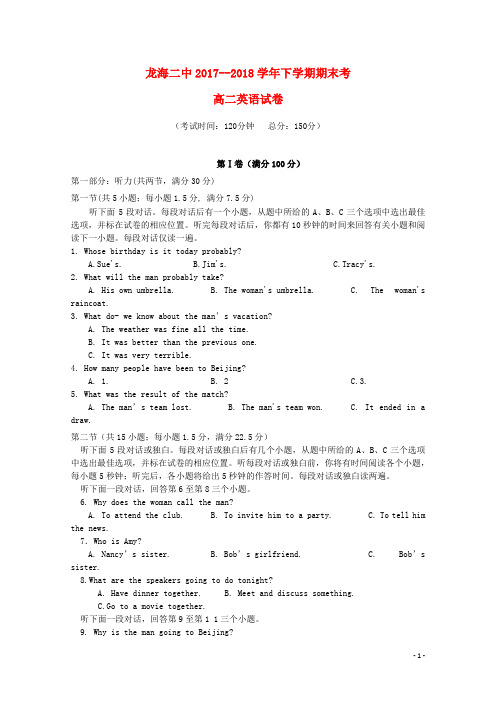
龙海二中2017--2018学年下学期期末考高二英语试卷(考试时间:120分钟总分:150分)第Ⅰ卷(满分100分)第一部分:听力(共两节,满分30分)第一节(共5小题;每小题1.5分, 满分7.5分)听下面5段对话。
每段对话后有一个小题,从题中所给的A、B、C三个选项中选出最佳选项,并标在试卷的相应位置。
听完每段对话后,你都有10秒钟的时间来回答有关小题和阅读下一小题。
每段对话仅读一遍。
1. Whose birthday is it today probably?A.Sue's.B.Jim's.C.Tracy's.2. What will the man probably take?A. His own umbrella.B. The woman's umbrella.C. The woman's raincoat.3. What do- we know about the man’s vacation?A. The weather was fine all the time.B. It was better than the previous one.C. It was very terrible.4. How many people have been to Beijing?A. 1.B. 2C.3.5. What was the result of the match?A. The man’s team lost.B. The man's team won.C. It ended in a draw.第二节(共15小题;每小题1.5分,满分22.5分)听下面5段对话或独白。
每段对话或独白后有几个小题,从题中所给的A、B、C三个选项中选出最佳选项,并标在试卷的相应位置。
听每段对话或独白前,你将有时间阅读各个小题,每小题5秒钟;听完后,各小题将给出5秒钟的作答时间。
福建省龙海市第二中学2017-2018学年高二下学期期末考试英语试题及答案解析
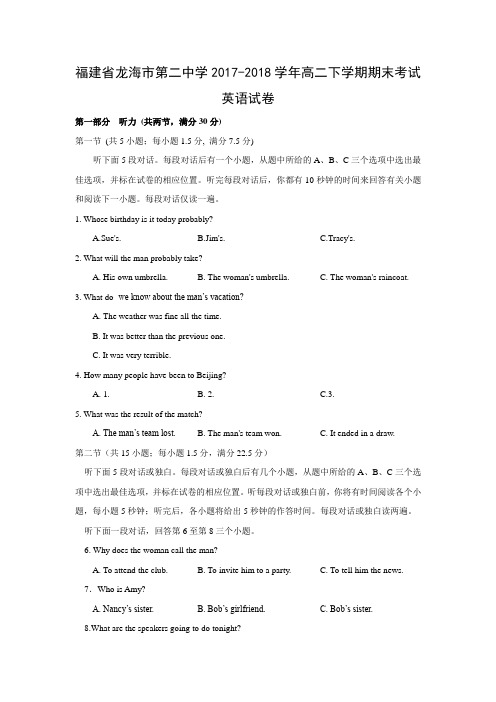
福建省龙海市第二中学2017-2018学年高二下学期期末考试英语试卷第一部分听力(共两节,满分30分)第一节(共5小题;每小题1.5分, 满分7.5分)听下面5段对话。
每段对话后有一个小题,从题中所给的A、B、C三个选项中选出最佳选项,并标在试卷的相应位置。
听完每段对话后,你都有10秒钟的时间来回答有关小题和阅读下一小题。
每段对话仅读一遍。
1. Whose birthday is it today probably?A.Sue's.B.Jim's.C.Tracy's.2. What will the man probably take?A. His own umbrella.B. The woman's umbrella.C. The woman's raincoat.3. What do- we know about the man’s vacation?A. The weather was fine all the time.B. It was better than the previous one.C. It was very terrible.4. How many people have been to Beijing?A. 1.B. 2.C.3.5. What was the result of the match?A. The man’s team lost.B. The man's team won.C. It ended in a draw.第二节(共15小题;每小题1.5分,满分22.5分)听下面5段对话或独白。
每段对话或独白后有几个小题,从题中所给的A、B、C三个选项中选出最佳选项,并标在试卷的相应位置。
听每段对话或独白前,你将有时间阅读各个小题,每小题5秒钟;听完后,各小题将给出5秒钟的作答时间。
每段对话或独白读两遍。
听下面一段对话,回答第6至第8三个小题。
福建省龙海一中高一英语上学期第二次月考试题

英语试题(考试时间:120分钟满分:150分)I.听力(略)30分Ⅱ. 单项填空(共15小题;每小题1分,满分15分)21. news that the Chinese first carrier was put into use has been hot topic among us.A. The; aB. /; aC. A; theD. /; the22. —He got his left ankle injured and has not played since.—When was ?—was on Nov. 10th when Houston Rockets beat Washington Wizards.A. that; ItB. it; ItC. this; ItD. it; That23. The Internet gives people the chance to have the information they look forwards ______to them quickly and cheaply.A. to deliverB. deliverC. to deliveringD. to delivered24. My uncle has become obviously healthier than before since he _____ smoking.A. gave inB. gave outC. gave awayD. gave up25.Steve spent as much time as he _____ over his lessons.A. could goB. could have goneC. could goingD. could to go26. -I'm going to the States.-How long _____ you _____ in the States?A. are; stayingB. would; stayC. have; stayedD. did; stay27. The first thing ________ we should do is to water the flowers in front of the room.A. whichB. asC. whatD. that28. Is this the shop ________ sells children’s clothing ?A. whichB. whereC. in whichD. what29. Give me any book ______ you think is suitable.A. thatB. from whichC. whatD. on which 30.The policeman asked with the old women.A. what the matter wasB. what was the matterC. what matter wasD. what was the wrong31. ---- Do you prefer ______ rather than join in the journey?---- Yes. I prefer ______ to leaving for the journey.A. stay; to stayB. to stay; stayC. to stay; stayingD. staying; to stay32.—Do you remember ______ we went to Norway?—Yes.The year before last.That was a good trip.A.where B.when C.how D. why33.—We’ve had three whole weeks without a drop of rain.—True. No crops will _____ if the dry weather continues.A. selectB. surviveC. explodeD. remove 34.He took up my cellphone and made a long distance call as if the phone _____ him.A. belonged toB. was belonging toC. was belonged toD. had been belonged to35. The exhibition is well worth _____ and you can see fancy vases of different dynasties on show there.A. to visitB. to be visitedC. being visitedD. visitingⅢ. 完形填空(共20小题;每小题1.5分,满分30分)Mr. Jones had always wanted to make a trip into the middle of Africa to shoot wild animals. 36 first he had no enough money, and then he was married. His wife had not wanted him to 37 her. At last his wife 38 to the trip if he allowed her to go, too.“But it will be very uncomfortable,” Mr. Jone s 39 her. “ It will be very hot and we shall live in a tent, and it 40 be dangerous. ”“I don’t care.” said his wife. “I want to go with you.” So they bought a big tent, camp beds, a refrigerator (电冰箱)which did not need 41 and many other things which would make the trip comfortable, and went off to the__42 of Africa.The first morning, 43 Mr. Jones took his gun and left the tent, he 44 his wife a bell and explained to her, “If you fell in 45 and you need me , 46 this belland I’ll come at once.”After a few minutes, he heard the bell and returned 47 to the tent. “What’s the matter?” he asked.“ 48 ” said his wife, “I was only 49 the bell.” Mr. Jones went off, but after a quarter of an hour, the bell rang 50 .Mr. Jones hurried back to the tent, but his wife said, “I’m 51 . I was cleaning our tent, and I knocked the bell over by mistake.” Mr. Jones returned to his __52 , but soon he heard the 53 once more. This time, when he got back to his 54 , the tent was burning and Mrs. Jones was lying on the ground, with 55 running from a big cut on her shoulder. “That’s better!” said Mrs. Jones. “This time the bell had been used correctly!”36. A. And B. But C. For D. So37. A. leave B. miss C. marry D. care38. A. allowed B. permitted C. satisfied D. agreed39. A. told B. advised C. persuaded D. warned40. A. may B. ought C. can’t D. shall41. A. money B. electricity C. force D. power42. A. south B. middle C. east D. west43. A. while B. until C. before D. after44. A. gave B. sent C. lent D. bought45. A. hurry B. surprise C. safety D. danger46. A. hit B. knock C. beat D. ring47. A. again B. back C. quickly D. home48. A. Something B. Nothing C. No D. None49. A. ringing B. trying C. using D. testing50. A. again B. once C. across D. away51. A. sorry B. happy C. tired D. all right52. A. tent B. wife C. trip D. hunting53. A. shot B. cry C. bell D. shout54. A. house B. garden C. camp D. office55. A.. tears B water C. blood D. sweatⅣ.阅读理解(共15小题;每小题2分,满分30分)ABriana, a student at John Fenwick School in Salem County, US,has a lot of free time. The 13-year-old girl used to hang outon the streets after school. “I know it wasn’t good, but Ireally had nothing else to do,” Briana said.Briana was not alone. Many kids in her city had too much freetime and nothing to do. To solve this problem, four school districts in Salem began Syeada Woods(L)and Briana.a program called Big Brothers/Big Sisters. The program helps students make good use of their after-school time. Big Brothers/Big Sisters invites mentors to help students in grades 6 to 8 build healthy relationships and take part in productive activities.The “Littles” and the “Bigs” are nicknames (昵称) for students and mentors. Most mentors are teachers. The “Bigs” and “Littles” usually meet once a week. They play games, share stories and go on trips.The program has already helped many Salem students.Bria na’s mentor is the school principal (校长), Syeda Woods. Woods took Briana ice-skating, to pizza parties and for a visit to Longwood Gardens in Pennsylvania. “When I got out, I saw that Salem is a very small place,” Briana said. “The program helps me experie nce the outside world and see many new things.”Kathy Jennings, 13, said she was very shy before, but now is much more open.“In the program, I see my mentor as a big sister, not a teacher. I can tell her anything,” Jennings said. “And she has taught me a l ot about making good decisions. I think it will make a big difference in my life.”56. The program of Big Brothers/Big Sisters is designed for .A. students aged 16 to 18B. students aged 8 to 16C. students in senior high schoolD. students in grades 6 to 857. The underline word “mentors” in the second paragraph most probably means “ ”.A. wise and trusted teachersB. experienced policeC. community volunteersD. careful parents58. The purpose of the program is to help students .A. live a full life after schoolB. learn tips on shoppingC. have more free timeD. know more about the streets59. The writer uses the examples of Briana and Kathy to show .A. Syeda is an amazing principleB. the success of the programC. the colourful life in SalemD. Briana was once very shyBA child who has once been pleased with a tale likes, as a rule, to have it retold in almost the same words, but this should not lead parents to treat printed fairy stories as formal texts. It is always much better to tell a story than read it out of a book, and, if a parent can produce what , in the actual situation of the time and the child, is an improvement on the printed text, so much the better.A change made against fairy tales is that they harm the child by frightening him or making him sad thinking. To prove the latter, one would have to show in a controlled experiment that children who have read fairy stories were more often sorry for cruelty than those who had not. As to fears, there are, I think, some cases of children being dangerously terrified by some fairy story. Often, however, this arises(出现) from the child having heard the story once. Familiarity with the story by repetition turns the pain of fear into the pleasure of a fear faced and mastered.There also people who object to fairy stories on the grounds that they are not objectively true, that giants, witches, two-headed dragons, magic carpets, etc. do not exist; and that, instead of being fond of the strange side in fairy tales, the child should be taught to learn the reality by studying history. I find such people, I must say so peculiar(奇怪的)that I don’t know how to argue with them. If their case were sound, the world should be full of mad men attempting to fly from New York to Philadelphia on a stick or covering a telephone with kisses in the belief that it was their beloved girl-friend.No fairy story ever declared to be a description of the real world and no clever child has ever believed that it was.60. The author considers that a fairy story is more effective when it is______.A. repeated without any changeB. treated as a jokeC. set in the presentD. given some changes by the parent61. According to the passage, great fear can take place in a child when the story is____.A. heard for the first timeB. in a realistic settingC. repeated too oftenD. told in a different way62. The author’s mention of sticks and telephones is meant to suggest that______.A. fairy stories are still being made upB. people try to modernize old fairy storiesC. there is some misunderstanding about fairy talesD. There is more concern for children’s fears nowadays63. One of the reasons why some people are not in favor of fairy tales is that_____.A. they are full of imaginationB. they are not interestingC. they just make up the stories which are far from the truthD. they make teachers of history difficult to teachCLike any good mother; when Karen found out that another baby was on the way, she did what she could to help her 3-year-old son, Michael, prepare for a new baby. They find out that the new baby is going to be a girl, and day after day, night after night, Michael sings to his sister in Mommy’s stomach.Finally, Michael’s little sister is born. But she is in serious condition. With alarm in the night, the ambulance rushes the infant to the neonatal(新生儿的)intensive care unit at St. Mary’s Hospital, Knoxville, Tennessee. The days go by. The little girl gets worse. The pediatric(儿科的)specialist tells the parents, “There is very little hope. Be prepared for the worst. ”Karen and her husband contact a local cemetery about a burial plot. They have fixed up a special room in their home for the new baby, but now they plan a funeral. Michael, keeps begging his parents to let him see his sister, “I want to sing to her, ” he says.Karen makes up her mind. She will take Michael whether they like it or not. Ifhe doesn’t see his sister now, he may never see her alive.She dresses him in an oversized suit and marches him into ICU. He looks like a walking laundry basket, but the head nurse recognizes him as a child and shouts, “Get that kid out of here now! No children are allowed. Never disturb patients here. ” The mother rises up strongly and said, “He is not leaving until he sings to his sister! ”Karen leads Michael to his sister’s bedside. He gazes at the tiny infant losing the battle to live. And he begins to sing. In the pure hearted voice of a 3-year-old, Michael sings: “You are my sunshine, my only sunshine, you make me happy when skies are gray. . . ” Instantly the baby girl responds. The pulse rate becomes calm and steady.The next day, the very next day, the little girl is well enough to go home! Woman’s Day magazine called it “the miracle of a brother’s song” . The medical staff just called it a miracle. Karen called it a miracle of Gods love!Never give up on dying people you love.64. What may the underlined words “the infant” in Paragraph 2 refer to?A. The baby.B. Karen.C. Mary.D. Michael.65. What do we know about the little sister after she was born?A. She was driven to St. Mary’s shop.B. A doctor came to see her in her house.C. She was very thin and couldn’t speak.D. She was in great danger.66. Why did Karen firmly let little Michael see his sister in ICU?A. Because he could make his sister alive.B. Because his sister would be sent to a far hospital.C. Because his sister was going to die soon.D. Because his father wanted to take him away.67. What is the general idea of the text?A. A boy’s singing saved his sister’s life.B. The little girl is well enough to go home.C. Michael’s little sister is born with a serious disease.D. No children are allowed to enter the intensive care unit.DAmong the four skills in learning English, which of these is the“Odd-Man-Out” ?The answer is speaking. The other three you can doalone on your own. But you can’t really speak alone! Speaking toyourself can be “dangerous” because men in white coats may come andtake you away!Where can you find people to speak English? And how can you practise speaking when you are alone?At school If you pay to go to a language school, you should use the chance to speak. If your teacher asks you to speak in pairs or groups with other students, try to say as much as possible. Don’t worry about your mistakes. Just speak!Conversation Clubs Many cities around the world have conversation clubs where people can exchange one language for another. Look in your local newspaper to find a conversation club near you. They are usually free although some may charge a small entrance fee.Shopping Even if you don’t want to buy anything, you can ask questions about products that interest you in a shop. “How much does this cost?” “Can I pay by cheque?” Often you can start a real conversation—and it costs you nothing!Cafes and Bars There are often American, Britain, Irish and Australian cafes and bars in many large cities. If you can find one, you’ll probably meet many people speaking English as a first or second language.Language is all around you Everywhere you go, you find language. Shop names, street names, advertisements, notices, and car numbers. . . . When you walk down the street, pr actise reading the words and numbers that you see. Say them to yourself. It’s not exactly a conversation, but it will help you to “think” in English. But don’t speak too loud!Songs and Video Repeat the words of an English-language song singing with the music until it becomes automatic. It’s good practice for your memory and for the mouth muscles that you need for English. Above all, speak as much as possible! Make as many mistakes as possible! When you know that you have made a mistake, you know that youhave made progress!68. What does “Odd-Man-Out” probably mean according to the passage?A. Someone or something appearing different from others.B. Someone or something standing out of the group.C. Someone or something arranged in pairs.D. Someone or something easily mistaken for another.69.What might happen if you speak to yourself loud in public?A. The police will take you away and punish youB. The doctors will force you to stay in hospital.C. You will have to pay to escape being punished.D. You will be forbidden to be member of the club.70. In which places can you learn English NOT free of charge?A. At school, in conversation clubs and cafes and bars.B. At school, in shops, cafes and bars.C. In conversation clubs, shops, songs and video.D. In conversation clubs and in the streets.第Ⅱ 卷(非选择题,共45分)第一节:根据下列句子的意思,在空格处填入正确的词。
福建省龙海市2017-2018学年高一下学期第一次月考(4月)英语word版有答案AwUUUn
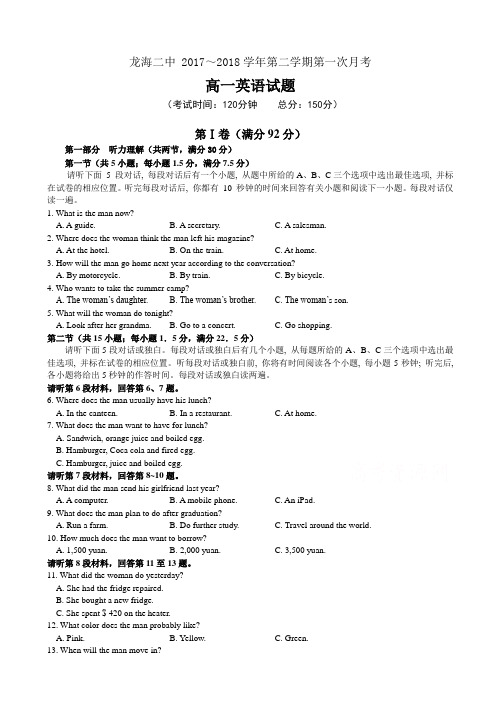
龙海二中2017~2018学年第二学期第一次月考高一英语试题(考试时间:120分钟总分:150分)第Ⅰ卷(满分92分)第一部分听力理解(共两节,满分30分)第一节(共5小题;每小题1.5分,满分7.5分)请听下面5 段对话, 每段对话后有一个小题, 从题中所给的A、B、C三个选项中选出最佳选项, 并标在试卷的相应位置。
听完每段对话后, 你都有10 秒钟的时间来回答有关小题和阅读下一小题。
每段对话仅读一遍。
1. What is the man now?A. A guide.B. A secretary.C. A salesman.2. Where does the woman think the man left his magazine?A. At the hotel.B. On the train.C. At home.3. How will the man go home next year according to the conversation?A. By motorcycle.B. By train.C. By bicycle.4. Who wants to take the summer camp?A. The woman’s daughter.B. The woman’s brother.C. The woman’s son.5. What will the woman do tonight?A. Look after her grandma.B. Go to a concert.C. Go shopping.第二节(共15小题;每小题1.5分,满分22.5分)请听下面5段对话或独白。
每段对话或独白后有几个小题, 从每题所给的A、B、C三个选项中选出最佳选项, 并标在试卷的相应位置。
听每段对话或独白前, 你将有时间阅读各个小题, 每小题5秒钟; 听完后, 各小题将给出5秒钟的作答时间。
福建省龙海市高三上学期第二次月考英语试题含答案

高三上学期第二次月考英语试卷(考试时间:120分钟总分:150分)第I卷(共100分)第一部分听力(共两节, 满分30分)听下面5 段对话。
每段对话后有一个小题,从题中所给的A、B、C 三个选项中选出最佳选项。
听完每段对话后,你都有10 秒钟的时间来回答有关小题和阅读下一小题。
每段对话仅读一遍。
1. Where are the speakers probably going?A. A theater.B. A stadium.C. A classroom.2. What are the speakers probably talking about?A. A holiday.B. A party.C. A meeting.3. What does the woman ask Jimmy to do?A. T ake out the garbage.B. Visit his grandparents.C. Clean the kitchenfloor.4. What will the man do this Saturday?A. Attend a party.B. Visit a friend.C. See a film.5. What did Jason think of his trip to Africa?A. Exciting.B. Boring.C. Tiring.第二节(共15 小题;每小题1.5 分, 满分22.5 分)听下面5段对话或独白。
每段对话或独白后有几个小题,从题中所给的A、B、C 三个选项中选出最佳选项,并标在试卷的相应位置。
听每段对话或独白前,你将有时间阅读各个小题,每小题5 秒钟;听完后,各小题将给出5 秒钟的作答时间。
每段对话或独白读两遍。
听下面一段对话,回答第6和第7两个小题。
6. Whose birthday is it tomorrow?A. Annie’s.B. Michael’s.C. L ynn’s.7. Why will John go to London?A. For a meeting.B. For a piano concert.C. For an international festival.听下面一段对话,回答第8和第9两个小题。
福建省龙海市第二中学2017-2018学年高一上学期第一次月考英语试题含答案
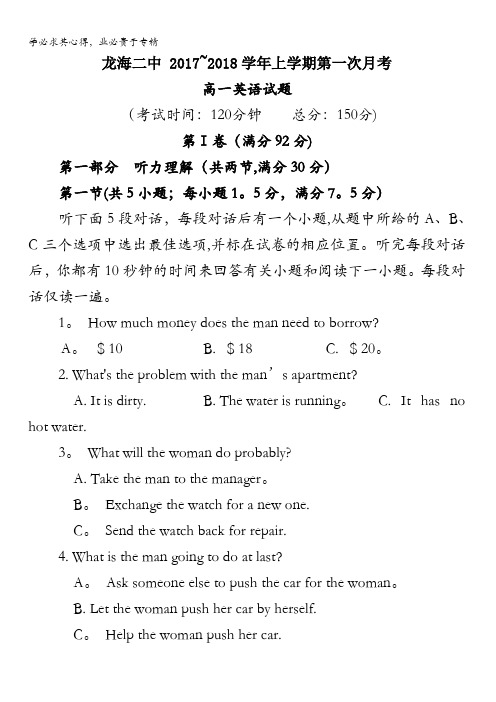
龙海二中2017~2018学年上学期第一次月考高一英语试题(考试时间:120分钟总分:150分)第Ⅰ卷(满分92分)第一部分听力理解(共两节,满分30分)第一节(共5小题;每小题1。
5分,满分7。
5分)听下面5段对话,每段对话后有一个小题,从题中所给的A、B、C三个选项中选出最佳选项,并标在试卷的相应位置。
听完每段对话后,你都有10秒钟的时间来回答有关小题和阅读下一小题。
每段对话仅读一遍。
1。
How much money does the man need to borrow?A。
$10 B. $18 C. $20。
2. What's the problem with the man’s apartment?A. It is dirty.B. The water is running。
C. It has no hot water.3。
What will the woman do probably?A. Take the man to the manager。
B。
Exchange the watch for a new one.C。
Send the watch back for repair.4. What is the man going to do at last?A。
Ask someone else to push the car for the woman。
B. Let the woman push her car by herself.C。
Help the woman push her car.5。
Where does this conversation take place probably?A. At the clinic. (诊所)B. In the kitchen。
C. In the drugstore。
(药店)第二节(共15小题;每小题1。
5分,满分22.5分)听下面5段对话或独白.每段对话或独白后有2至4个小题,从题中所给的A、B、C三个选项中选出最佳选项,并标在试卷的相应位置。
【精选】福建省龙海市高三英语上学期第二次月考试题

2017-2018学年上学期第二次月考高三英语试卷(考试时间:120分钟总分:150分)第Ⅰ卷(满分100分)第一部分听力理解第一节(共5小题;每小题1.5分,满分7.5分)听下面5段对话。
每段对话后有一个小题,从题中所给的A、B、C三个选项中选出最佳选项,并标在试卷的相应位置。
听完每段对话后,你都有10秒钟的时间来回答有关小题和阅读下一小题。
每段对话仅读一遍。
1. What do we learn from the conversation?A. There will be a math exam tomorrow.B. Today is the man’s birthday.C. The man doesn’t like math exams.2. What colour is the woman’s dress?A. Blue.B. White.C. Black.3. When did the man’s daughter set a new world record?A. In 1999.B. In 2005.C. In 2009.4. What does the man mean?A. He moved the desk alone.B. He had some classmates move the desk.C. His classmates helped him move the desk.5. What time is it now?A: 3:10. B: 3:15. C. 4:10.第二节(共15小题;每小题1.5分,满分22.5分)听下面5段对话或独白。
每段对话或独白后有几个小题,从题中所给的A、B、C三个选项中选出最佳选项,并标在试卷的相应位置。
听每段对话或独白前,你将有时间阅读各个小题,每小题5秒钟;听完后,各小题将给出5秒钟的作答时间。
每段对话或独白读两遍。
听第6段材料,回答第6、7题。
2017-2018学年福建省龙海市第二中学高一下学期第一次月考(4月)英语 Word版含答案
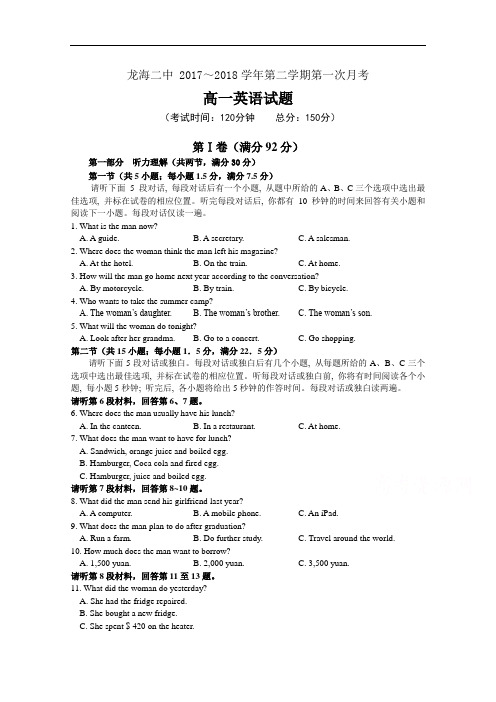
龙海二中2017~2018学年第二学期第一次月考高一英语试题(考试时间:120分钟总分:150分)第Ⅰ卷(满分92分)第一部分听力理解(共两节,满分30分)第一节(共5小题;每小题1.5分,满分7.5分)请听下面5 段对话, 每段对话后有一个小题, 从题中所给的A、B、C三个选项中选出最佳选项, 并标在试卷的相应位置。
听完每段对话后, 你都有10 秒钟的时间来回答有关小题和阅读下一小题。
每段对话仅读一遍。
1. What is the man now?A. A guide.B. A secretary.C. A salesman.2. Where does the woman think the man left his magazine?A. At the hotel.B. On the train.C. At home.3. How will the man go home next year according to the conversation?A. By motorcycle.B. By train.C. By bicycle.4. Who wants to take the summer camp?A. The woman’s daughter.B. The woman’s brother.C. The woman’s son.5. What will the woman do tonight?A. Look after her grandma.B. Go to a concert.C. Go shopping.第二节(共15小题;每小题1.5分,满分22.5分)请听下面5段对话或独白。
每段对话或独白后有几个小题, 从每题所给的A、B、C三个选项中选出最佳选项, 并标在试卷的相应位置。
听每段对话或独白前, 你将有时间阅读各个小题, 每小题5秒钟; 听完后, 各小题将给出5秒钟的作答时间。
福建省龙海市2017-2018学年高一英语上学期第一次月考试题

2017~2018学年上学期第一次月考高一英语试题(考试时间:120分钟总分:150分)第Ⅰ卷(满分92分)第一部分听力理解(共两节,满分30分)第一节(共5小题;每小题1.5分,满分7.5分)听下面5段对话,每段对话后有一个小题,从题中所给的A、B、C三个选项中选出最佳选项,并标在试卷的相应位置。
听完每段对话后,你都有10秒钟的时间来回答有关小题和阅读下一小题。
每段对话仅读一遍。
1. How much money does the man need to borrow?A. $10B. $18C. $20.2. What’s the problem with the man’s apartment?A. It is dirty.B. The water is running.C. It has no hot water.3. What will the woman do probably?A. Take the man to the manager.B. Exchange the watch for a new one.C. Send the watch back for repair.4. What is the man going to do at last?A. Ask someone else to push the car for the woman.B. Let the woman push her car by herself.C. Help the woman push her car.5. Where does this conversation take place probably?A. At the clinic. (诊所)B. In the kitchen.C. In the drugstore. (药店)第二节(共15小题;每小题1.5分,满分22.5分)听下面5段对话或独白。
2017-2018学年福建省龙海市第二中学高一上学期第二次月考英语试题(含听力)
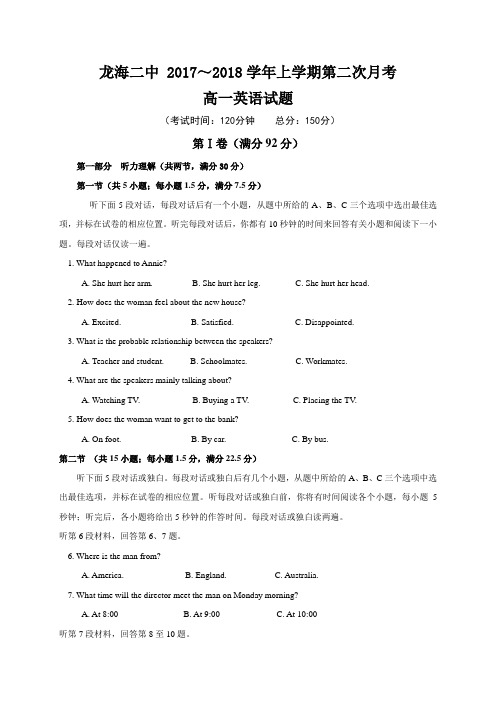
龙海二中2017~2018学年上学期第二次月考高一英语试题(考试时间:120分钟总分:150分)第Ⅰ卷(满分92分)第一部分听力理解(共两节,满分30分)第一节(共5小题;每小题1.5分,满分7.5分)听下面5段对话,每段对话后有一个小题,从题中所给的A、B、C三个选项中选出最佳选项,并标在试卷的相应位置。
听完每段对话后,你都有10秒钟的时间来回答有关小题和阅读下一小题。
每段对话仅读一遍。
1. What happened to Annie?A. She hurt her arm.B. She hurt her leg.C. She hurt her head.2. How does the woman feel about the new house?A. Excited.B. Satisfied.C. Disappointed.3. What is the probable relationship between the speakers?A. Teacher and student.B. Schoolmates.C. Workmates.4. What are the speakers mainly talking about?A. Watching TV.B. Buying a TV.C. Placing the TV.5. How does the woman want to get to the bank?A. On foot.B. By car.C. By bus.第二节(共15小题;每小题1.5分,满分22.5分)听下面5段对话或独白。
每段对话或独白后有几个小题,从题中所给的A、B、C三个选项中选出最佳选项,并标在试卷的相应位置。
听每段对话或独白前,你将有时间阅读各个小题,每小题5秒钟;听完后,各小题将给出5秒钟的作答时间。
每段对话或独白读两遍。
听第6段材料,回答第6、7题。
6. Where is the man from?A. America.B. England.C. Australia.7. What time will the director meet the man on Monday morning?A. At 8:00B. At 9:00C. At 10:00听第7段材料,回答第8至10题。
- 1、下载文档前请自行甄别文档内容的完整性,平台不提供额外的编辑、内容补充、找答案等附加服务。
- 2、"仅部分预览"的文档,不可在线预览部分如存在完整性等问题,可反馈申请退款(可完整预览的文档不适用该条件!)。
- 3、如文档侵犯您的权益,请联系客服反馈,我们会尽快为您处理(人工客服工作时间:9:00-18:30)。
龙海二中2017~2018学年上学期第二次月考高一英语试题(考试时间:120分钟总分:150分)第Ⅰ卷(满分92分)第一部分听力理解(共两节,满分30分)第一节(共5小题;每小题1.5分,满分7.5分)听下面5段对话,每段对话后有一个小题,从题中所给的A、B、C三个选项中选出最佳选项,并标在试卷的相应位置。
听完每段对话后,你都有10秒钟的时间来回答有关小题和阅读下一小题。
每段对话仅读一遍。
1. What happened to Annie?A. She hurt her arm.B. She hurt her leg.C. She hurt her head.2. How does the woman feel about the new house?A. Excited.B. Satisfied.C. Disappointed.3. What is the probable relationship between the speakers?A. Teacher and student.B. Schoolmates.C. Workmates.4. What are the speakers mainly talking about?A. Watching TV.B. Buying a TV.C. Placing the TV.5. How does the woman want to get to the bank?A. On foot.B. By car.C. By bus.第二节(共15小题;每小题1.5分,满分22.5分)听下面5段对话或独白。
每段对话或独白后有几个小题,从题中所给的A、B、C三个选项中选出最佳选项,并标在试卷的相应位置。
听每段对话或独白前,你将有时间阅读各个小题,每小题5秒钟;听完后,各小题将给出5秒钟的作答时间。
每段对话或独白读两遍。
听第6段材料,回答第6、7题。
6. Where is the man from?A. America.B. England.C. Australia.7. What time will the director meet the man on Monday morning?A. At 8:00B. At 9:00C. At 10:00听第7段材料,回答第8至10题。
8. Why does the boy want to get cable TV?A. There are more channels.B. It is cheap and convenient.C. The programmes are more interesting.9. What kind of programmes does the boy watch only?A. Action movies.B. Advertisements.C. Educational programmes.10. What can we lean from the conversation?A. The boy is spoiled by the woman.B. The boy has to study hard this term.C. The woman agrees to get cable TV finally.听第8段材料,回答第11至13题。
11. Where is the Flower Show?A. In the City Park.B. In the Forest Park.C. In the Flower Park.12. What did the woman’s daughter say about the Flower Show?A. It was beautiful.B. It is open in the morning.C. It is one of the tourist attractions in her city.13. What can we learn from the conversation?A. The man will go to the Flower Show.B. The woman has been to see the Flower Show once.C. The woman’s daughter went to the Flower Show yesterday.听第9段材料,回答第14题至17题。
14. Wha t is the woman’s problem?A. She forgot to buy apple pies.B. The apple pies she made have gone bad.C. She doesn’t know what to have for dessert.15. What does the woman say about Steve’s parents?A. They are too polite.B. They always complain to Steve.C. They like to have healthy food.16. What does the man suggest the woman do?A. Go out to have dinner.B. Buy some fruit and vegetables.C. Prepare fruit and cheese for dessert.17. What is the probable relationship between the woman and Steve?A. Husband and wife.B. Brother and sister.C. Colleagues.听第10段材料。
回答18至20题。
18. What is the speaker’s main purpose of coming to England?A. To visit the city.B. To visit her boyfriend.C. To attend a conference and exhibition.19. What did the speaker do yesterday?A. She visited Chinatown.B. She did some shopping.C. She went to an exhibition.20. Where is the stand of the speaker’s company?A. Near the restaurant.B. Near the coffee shop.C. Near the clothes shop.第二部分阅读理解 (共两节,满分32分)第一节(共11小题;每小题2分,满分22分)AIf you are looking for the place that has everything, there is only one place to visit, and that’s New York. It’s a whole world in a city.The World of Theater: All of New York is a stage. And it begins with Broadway. Where else can you find so many hit shows in one place? Only in New York!The World of Music: Spend an evening with Beethoven at Lincoln Center. Swing to the great jazz of Greenwich Village. Or rock yourself silly at the hottest dance spots found anywhere.The World of Art: From Rembrandt to Picasso(毕加索). From Egyptian tombs to Indian teepees. Whatever kind of art you like, you will find it in New York.The World of Fine Dining: Whether it’s roast Beijing duck in Chinatown, lasagna in little Italy, or the finest French coq au vin found everywhere, there is world of great taste waiting for you in New York.The World of Sights: What other city has a Statue (雕塑) of Liberty? A Rockefeller Center? Or a Bronx Zoo? Where else can you take a horse-drawn carriage through Central Park ? Only in New York !21. F rom the text we know that “Rembrandt” is most likely to be the name of a famous .A. actorB. musicianC. cookD. painter22. Which of the following can visitors do only in New York?A. To see the Statue of Liberty.B. To taste the finest French coq au vin.C. To enjoy a Beethoven concert.D. To eat Roast Beijing Duck.23. This passage may be taken from .A. a handbook for English learnersB. a guidebook for foreign travellersC. a pocketbook for businessmenD. a storybook for local readersBParents often believe that they have a good relationship with their teenagers.But last summer,Joanna and Henry noticed a change in their older son:suddenly he seemed to be talking more to his friends than to his parents.“The door to his room is always shut,”Joanna noted.Tina and Mark noticed similar changes in their 14-year-old daughter.“She used to cuddle up(蜷伏)with me on the sofa and talk,”said Mark.“Now we joke that she does this only when she wants something.Sometimes she wants to be treated like a 1ittle girl and sometimes like a young lady.The problem is figuring out which time is which.”Before age 11,children like to tell their parents what’s on their minds.“In fact,parents are first on the list,”said Michael Riera,author of Uncommon Sense for Parents with Teenagers.“This completely changes during the teen years,”Riera explained.“They talk to their friends first,then maybe their teachers,and their parents last.”Parents who know what’s going on in their teenagers’ lives are in the best position to help them.To break down the wall of silence,parents should create chances to understand what their children want to say,and try to find ways to talk and write to them.And they must give their children a mental break,for children also need freedom,though young.Another thing parents should remember is that to be a friend,not a manager,with their children is a better way to know them.24.“The door to his room is always shut” suggests that the son________.A.is always busy with his studies B.is angry with his parentsC.keeps himself away from his parents D.begins to dislike his parents25.What troubles Tina and Mark most is that_______.A.their daughter isn’t as lovely as beforeB.they can’t read their daughter’s mind exactlyC.they don’t know what to say to their daughterD.their daughter has grown up so quickly26.Which of the following best explains “the wall of silence” in the last paragraph?A.Teenagers do not talk much with their parents.B.Teenagers do not want to understand their parents.C.Teenagers talk a lot with their friends.D.Teenagers talk much about their own lives.27.What can be learned from the passage?A.Parents are unhappy with their growing children.B.Parents have suitable ways to talk with their teenagers.C.Parents should force their children to talk with them.D.Parents should try to understand their teenagers.CSome people think they have an answer to the problems of automobile(机动车)crowding and pollution in large cities. Their answer is the bicycle, o r “bike”.In a great many cities, hundreds of people ride bicycles to work every day. In New York City, some bike riders have even formed a group called Bike for a Better City. They claim that if more people rode bicycles to work,there would be fewer automobikes in the downtown(市中心)section of the city and therefore less dirty air from car engines.For several years this group has been trying to get the city government to help bicycle riders. For example, they want the city to paint special lanes(车道) for bicycle on some of the main streets, because when bicycle riders must use the same lanes as cars, there may be accidents. Bike for a Better City feels that if there were special lanes, more people would use bikes.But no bicycle lanes have been painted yet. Not everyone thinks they are a good idea. Taxi drivers don’t like the idea –they say it will slow traffic. Some store owners on the main streets don’t lik e the idea –they say that if there is less traffic, they will have less business. And most people live too far from downtown to travel by bike.The city government has not yet decided what to do. It wants to keep everyone happy. On weekends, Central Park –the largest open space in New York –is closed to cars, and the roads may be used bybicycles only. But Bike for a Better City says that this is not enough and keeps fighting to get bicycle lanes downtown(市中心). Until that happens, the safest place to bicycle may be in the park.28. Some people founded Bike for a Better City because ______.A. there are no bikes in New York City nowB. they wanted to reduce the traffic and pollutionC. th ere are no bike lanes in New York City nowD. traffic has been too slow29. Some people a re against the idea of bicycle lanes because they think ______.A. they will not reduce th e trafficB. there will be traffic accidentsC. they will make traffic less and slowerD. traffic moves slowly in bike lanes30. Which is the best possible title for the passage?A. The safest place for bicycle riders.B. Special lanes to a greener city.C. Fight for a better environment.D. Less traffic, greener city.31. What is the attitude of the author towards painting bike lanes?A. WelcomeB. NegativeC. SurprisedD. Neutral(中立的)第二节(共5小题;每小题2分,满分10分)根据短文内容,从短文后的选项中选出能填入空白处的最佳选项,选项中有两项为多余选项。
